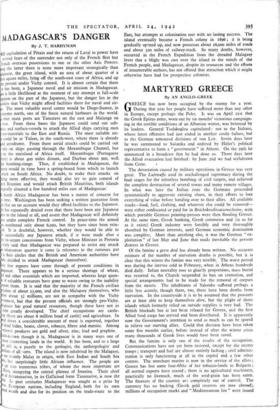MADAGASCAR'S DANGER
By J. T. HARDYMAN HE capitulation of Petain and the return of Laval to power have revived fears of the surrender not only of the French fleet but French overseas possessions to one or the other Axis Powers. the latter there is none more important strategically than gascar, the great island, with an area of about quarter of a vn square miles, lying off the south-east coast of Africa, and up the present under Vichy control. It is almost certain that there or has been, a Japanese naval and air mission in Madagascar. e is little likelihood at the moment of any attempt at full-scale tion on the part of the Japanese, but the danger lies in the bility that Vichy might afford facilities there for naval and air- The most valuable naval centre would be Diego-Suarez, in extreme north, one of the finest natural harbours in the world. other main ports are Tamatave on the east and Majunga on west. From these bases the Japanese could send out sub-
s and surface-vessels to attack the Allied ships carrying men war-materials to the East and Russia. The most suitable air- would be at Tulear, in the south-west, where there is already aerodrome. From there aerial attacks could be carried out only on ships passing through the Mozambique Channel, but on the mainland of Africa itself. Mozambique (Portuguese ory) is about 40o miles distant, and Durban about goo, well- bombing-range. Thus, if established in Madagascar, the ese would in time have a spring-board from which to launch attack on South Africa. No doubt, to make their attacks on ing more effective, they would also try to gain control of ch Reunion and would attack British Mauritius, both islands egically situated a few hundred miles east of Madagascar.
South Africa Madagascar been been a matter of concern for time. Washington has been seeking a written guarantee from y that on no account would they afford facilities to the Japanese. y has repeatedly denied even that there have been any Japanese is in the island at all, and assert that Madagascar will definitely in under complete French control. In peace-time the armed numbered only about 6,000, but they have since been rein- . It is doubtful, however, whether they would be able to q successfully any Japanese attack, if it were made after a re to secure concessions from Vichy, whose Minister in Pretoria lately said that Madagascar was prepared to resist any attack whatsoever quarter it came (a reference to the rumours put In Axis circles that the British and American authorities have y decided to attack Madagascar themselves).
Cry few reports have come through of present conditions in gascar. There appears to be a serious shortage of wheat, I and other essentials which are imported, whereas large quan- al valuable resources have gone to waste owing to the inability Pon them. It is said that the majority of the French civilian Lion of about 25,000, and also the Malagasy themselves, who
ber about millions, are not in sympathy with the Vichy eminent, but that the present officials are strongly pro-Vichy. 3gascar has good natural resources, though these have not as peen greatly developed. The chief occupations are cattle- (there are about 6 million head of cattle) and agriculture. In .times a considerable amount of meat is exported, together dried hides, beans, cloves, tobacco, fibres and. manioc. Among !mineral products are gold and silver, zinc, lead and graphite. e-known though it is, Madagascar is in many ways one of most interesting lands in the world. It has been, and to a large t still is, a puzzle to the geologist, the anthropologist and fists of all :orts. The island is now inhabited by the Malagasy, are mainly Malay in origin, with East Indian and South Sea but surprisingly little African influence. The people are uP into numerous tribes, of whom the most important are Hen, occupying the central plateau of Imerina. Their chief of Antananarivo, in its Gallicised form Tananarive, is now the In past centuries Madagascar was sought as a prize by s European nations, including England, both for its own weath and also for its position on the trade-route to the
East, but attempts at colonisation met with no lasting success. The island eventually became a French colony in 1896 ; it is being gradually opened up, and now possesses about 16,000 miles of roads and about too miles of railway-track. So many deaths, however, occurred in the French Expedition from the dreaded Malagasy fever that a blight was cast over the island in the minds of the French people, and Madagascar, despite its resources and the efforts of innumerable authors, has not offered that attraction which it might otherwise have had for prospective colonists.






















 Previous page
Previous page